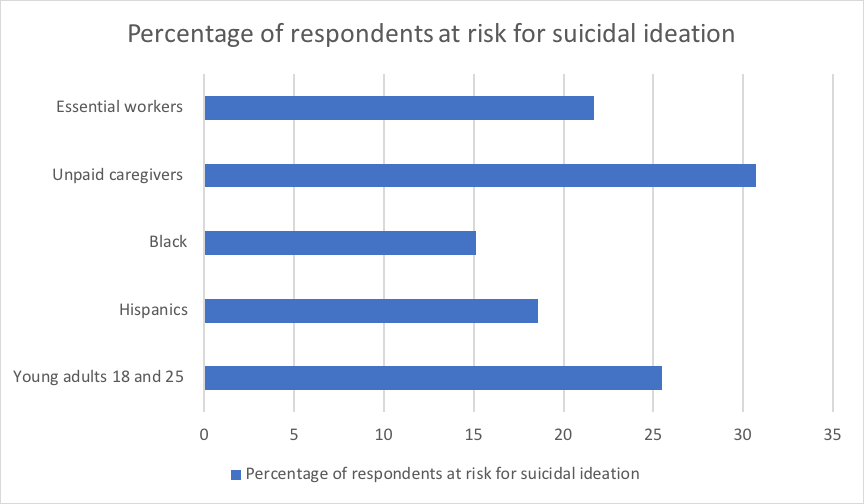September is Suicide Prevention Awareness Month and never has there been a more important time to talk about mental health. The last few months have been like no other. Whether you’re a parent, an essential worker, or working remotely, the pandemic has impacted each and every one of us in profound, long-lasting ways. On top of COVID, there have been other stressors, including economic instability, racial injustice and the looming election. Even when the virus subsides, there is no way of knowing what the world will look like.
At Civilian, we are passionate about opening up dialogue around mental health and shattering stigma. Especially during these times where we are physically separated from loved ones, it is imperative to reach out to others and talk about mental health.
The Pandemic’s Impact on Mental Health
Let’s start with the facts. A study conducted by the National Center for Health Statistics shows that at this time last year, roughly one in 12 American adults reported symptoms of an anxiety disorder. Today that number is one in three. Untreated anxiety and stress are also leading to a host of other concerns. According to the Kaiser Family Foundation:
- 36 percent of American adults are having trouble sleeping
- 32 percent are over- or undereating
- 18 percent are losing their temper more easily
- 13 percent are using substances to cope
Contemplation of Suicide is on the Rise
Nearly 11 percent of Americans seriously considered suicide in June. We’re seeing even higher rates of suicidal ideation in groups who have been hit hardest by the pandemic, including essential workers facing the daily stress of going to work in potentially unsafe conditions, unpaid caregivers managing the needs of quarantined parents and kids; and young adults feeling uncertain about the future.

While these statistics are sobering, they serve as a great reminder that we are all at risk and need to check in on our own mental health and the welfare of those around us.
Tips for Managing Personal Mental Health
It’s important to remember this time of uncertainty is completely unprecedented, and any concerns you’re feeling are to be expected. Even if you have not been impacted financially or physically, it’s normal to struggle emotionally.
If you find yourself in need, here are a few simple but effective actions to consider.
- Reach out to a friend or loved one that you know will give you the space to safely express your emotions, without judgement. If you are not comfortable talking about your feelings, journaling is another great avenue for releasing your emotions.
- Realize what you can and cannot control. Limit your exposure to emotional triggers (ex. the news) and focus on activities that make you feel good, like exercising, meditating or caring for a pet.
- Remember, though it may not seem like it now, this will end. The crisis will pass, and you have survived 100 percent of the challenges you have faced.
- If in need, there are resources available, call the National Suicide Prevention Lifeline at (800) 273-8255
Watching for Warning Signs
In the beginning, there were constant check-ins with loved ones, Zoom happy hours, and an increased sense of connectivity. Now, five months into the pandemic, fatigue is setting in, making it hard to find the energy to reach out. Unfortunately, people experiencing anxiety, depression or suicidal thoughts are not likely to talk about it or ask for help. That’s why it’s more important than ever to make sure you’re talking to your circle and keeping an ear open for signs that could be of concern.
Here are some specific ways you can make a difference if you suspect a friend or loved one may be considering suicide:
- Learn the warning signs for suicide.
People thinking of ending their life often give hints about their intentions. Pay attention to cues, and don’t hesitate to take action even if you’re unsure. To learn more about the warning signs of suicide, click here. - Stay involved.
Continue to reach out, be persistent, and tell them how much you care. - Start the conversation.
Although it may be difficult, talking openly is a crucial step for someone in need. Try starting with: - “I am worried about you.”
- “It seems like something is bothering you.”
- “You don’t seem like yourself lately. How can I help?”
Then continue to be direct and ask for more information:
- “Are you depressed?”
- “Are you feeling that there is no way out?”
- “Are you thinking about ending your life?”
- If you think the person is suicidal:
Connect them with the help they need immediately. Have them call National Suicide Prevention Lifeline at (800) 273-8255 or better yet make the call with them.
It has never been more important than now to know the signs of mental distress, create a dialog, and reach out to let those around know you care. It can be hard, but you could be saving a life. You can learn more at www.suicideispreventable.org




